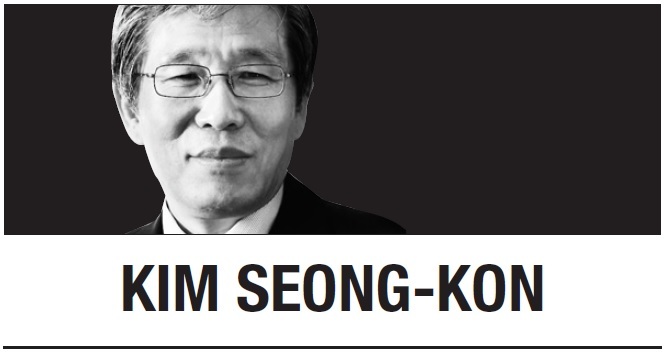[Kim Seong-kon] Why have I become modernist again despite its faults?
By Kim Seong-konPublished : April 29, 2020 - 07:01

When I returned to Korea from the States in early 1984, few Koreans knew what postmodernism was. At that time, Korean scholars and writers were engaged in an ideological warfare, divided by two camps: realism and modernism. Realists called for a socially engaged literature that they dubbed “national literature” and “people’s literature,” which means that literature should inspire nationalism and serve leftwing political ideology that promotes the proletariat or working-class. On the contrary, those who subscribed to modernism advocated art-for-art’s sake, a kind of pure literature that was not restricted to a particular ideology or social milieu.
Amid such turmoil, I began teaching postmodernism at Seoul National University. Postmodern perceptions opened the eyes of my students who thought that the world was divided between realism and modernism only. Using the theories of Jacques Derrida, Michel Foucault, and Edward Said, I taught postmodern perceptions to my students, such as the idea that there is no absolute truth, no tyrannical center and no fixed boundaries.
I taught them the importance of middlebrow culture, the middle against both extremes, and the both/and mentality instead of the either/or bipolarity. From postmodernism, they learned to seek and find a Third Way that transcends the binary opposition of ones and zeroes, realism and modernism, or the Left and the Right. Indeed, postmodern perspectives significantly broadened and widened the horizon of my students’ minds and visions.
In the 1980s, however, it was by no means easy to be an advocate of postmodernism, which defies absolute truth and fixed boundaries. At the time, both realists and modernists believed that they expressed the absolute truth and all others were false. Naturally, both factions were suspicious of and hostile to the postmodernists that denounced the boundary of truth and falsity.
By the end of the late 1980s, however, postmodernism became prevalent in Korean society at last, against all odds. At that time, everybody talked about postmodernism, which became fashionable in every sphere of the Korean people’s lives. A decade-long era of national or people’s literature saturated with political ideology was over at last, and a host of fresh, talented writers, including many women authors, emerged, who boldly discarded political issues and explored the intricacies of the personal agonies of individuals instead.
Ever since, postmodernism has altered the Korean mind, and helped bring forth many remarkable things to Korea such as democratization, the rise of pop culture and cultural prosperity called Hallyu. The crossovers between literature, art, and music was another thing. In addition, postmodernism gave voice to ordinary people. That is to say, it took power from the elites and gave it back to the masses. Thus, I have never regretted my devotion to spreading postmodern perspectives in Korean society.
These days, however, I am inclined to return to old-fashioned modernism, which values highbrow culture, decency and order. It is especially so when I see unscrupulous political skirmishes and chaotic social disruptions in Korean society these days. Whenever I see muddled situations caused by impertinent masses of people or politicians who try to replace liberal democracy with direct democracy, I feel guilty as the one who has introduced postmodernism to Korea, even though such a tendency has nothing to do with the true nature of postmodernism. When I see pulp fiction-like TV programs, fake news, or vulgar slurs online, I intensely miss the merits of modernism such as integrity, dignity and nobility
Postmodernism teaches us to embrace differences among us and advocates diverse voices from diverse people. That is why Leslie Fiedler wrote an epoch-making essay, “The New Mutants,” in which he argued that even though they might look like monsters in the eyes of the conservatives, the liberal younger generation he called “The New Mutants” would prevail in future America.
When I see some deformed mutants in our society, however, I cannot but despair and feel guilty for contributing to creating such monsters in the name of postmodernism. Originally, I expected our New Mutants to belong in the school of Professor Xavier who seeks reconciliation with humanity, as delineated in the movie, The X-Men. Unfortunately, many of them belong to the faction of Magneto, a belligerent leader obsessed with resentment and vengeance.
Postmodernism is not responsible for social degradation, political turmoil, or vulgar lowbrow culture. Yet, it is undeniable that postmodernism has the above-mentioned undesirable side effects. Watching a chaotic world devoid of decorum and nobleness, I often want to be a modernist again despite its inherent downsides.
Kim Seong-kon
Kim Seong-kon is a professor emeritus of English at Seoul National University and a visiting scholar at Dartmouth College. -- Ed.








![[Kim Seong-kon] Democracy and the future of South Korea](http://res.heraldm.com/phpwas/restmb_idxmake.php?idx=644&simg=/content/image/2024/04/16/20240416050802_0.jpg&u=)







![[KH Explains] Hyundai's full hybrid edge to pay off amid slow transition to pure EVs](http://res.heraldm.com/phpwas/restmb_idxmake.php?idx=652&simg=/content/image/2024/04/18/20240418050645_0.jpg&u=20240418181020)

![[Today’s K-pop] Zico drops snippet of collaboration with Jennie](http://res.heraldm.com/phpwas/restmb_idxmake.php?idx=642&simg=/content/image/2024/04/18/20240418050702_0.jpg&u=)